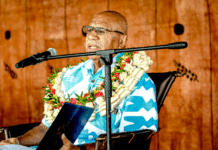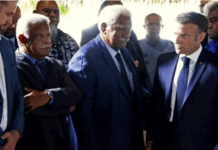
EDITORIAL: By the PNG Post-Courier
Last year, the Papua New Guinea government moved in a subtle way into the Fourth Estate.
It tried to — and is still trying to — find a way to curtail and restrict your access to mainstream and social media by trying to gag media organisations.
Obviously, this was an attack on media freedom. We were not going to take it sitting down.
- READ MORE: Masiu vows 10-day shutdown of PNG’s social media after capital riots
- PNG political fallout from deadly riots stirs call for vote over Marape
- PNG’s Gerehu became a ‘ghost town in the blink of an eye’ after riot
- Marape accuses ‘rogue police’ of being part of Port Moresby’s riots
- ‘Uphold right to life’ says watchdog in aftermath of deadly PNG unrest

We met the government head-on to protect our country’s media freedoms, and to ensure the public — that’s you — are well informed on what is happening in our country.
Today, we report on a government endeavor, which we consider extremely dangerous and an affront to the intelligence of Papua New Guineans, which we also believe is impinging our constitutional freedoms.
The government, in introducing a State of Emergency, has gone to a dangerous level of invoking section 70 of the NICTA Act.
Section 70, according to our Prime Minister, gives absolute rights to government agents including police, soldiers and undercover agents, to enter any home and check private house and property.
Section 70 also gives these agents all the power to search your phone. This is in our view draconian and extreme.
What will become of democracy? Is this a test run for what is yet to come?
We will support any move to impose restrictions that will save lives and protect properties and ensure peace and good order.
But we do not promote laws that will instill fear, limit freedom and impinge on the rights of the common people.
No to draconian governance, no to dictatorial leadership.
While we support the State of Emergency as a deterrent to further violence, looting and acts of terror against businesses and citizens, we consider the power to search without a warrant as a direct attack on the freedoms guaranteed by the constitution to our people.
This Section 70 of the National Information and Communication Technology (NICTA) Act 2009 seems to be the same section used by government in its recent attempt to curtail the media.
While this action seems to have been sparked by the Black Wednesday looting in Port Moresby on December 10, one cannot rule out the perplexity of the first sitting of Parliament on February 13 where a Vote of No Confidence in the government is looming.
The NICTA Act allows the government to require operator licensees, such as telecommunication companies, to provide ICT services, restrict or delay certain communications, disclose the content of specified communications to the Minister, and coordinate with other government organisations if necessary.
The activation of Section 70 is likely to agitate citizens regarding privacy rights and the protection of personal information.
However, the government contends that these measures are necessary to address public emergencies and ensure public safety.
The government has yet to come clear on how this section 70 will be enforced and carried out.
Will the police and army use section 70 to conduct raids on suspected homes, communities, and people?
Will there be search warrants for these phone searches, home searches, bag searches?
What is the recourse for the public if they are caught in the crossfire of section 70?
The Prime Minister and his Minister for Internal Security must explain this clearly.
This editorial was published by the PNG Post-Courier on 16 January 2024.














































